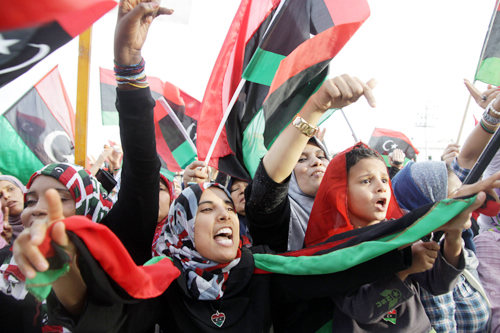|
 |
|
PEOPLE'S CELEBRATIONS: Libyans cheer during a celebration in Tripoli on October 23, the day the National Transitional Council declared Libya's liberation (XINHUA) |
Li Shaoxian, a senior researcher on Middle East studies with the China Institutes of Contemporary International Relations, echoed Li Guofu's views. Due to the NTC decision to adhere to Islamic law, conflicts between religious beliefs and secular society are rapidly growing. If this trend continues, Libya will also find itself at odds with the West, he said.
Libya had several major power centers in Benghazi, Misrata and Tripoli during the fight against Gaddafi, which reflected frictions between different regions, Li Shaoxian said. There are constant disputes and conflicts between different tribes due to historical reasons. Currently there are more than 100 tribes and ethnic groups in Libya.
Li Guofu said because of all the uncertainties it is hard to predict Libya's future. "Everything in Libya is unpredictable now. The only thing the outside world can do is to wait and see," he said.
While comparing Libya's postwar aftermath with turmoil in the wake of Western-led wars that toppled governments in Iraq and Afghanistan, Li Guofu said Libya has more resemblance with Afghanistan in cultural and social traditions. In Iraq, conflicts happen between warlords, while in Afghanistan, religious frictions are more common.
"If Libya's situation worsens, it might be the next Afghanistan," he warned.
Aside from the political process, reconstruction is now a top priority of the NTC and Libya. The months-long domestic conflict caused tens of thousands of casualties in Libya and many others became homeless. The country's infrastructure was seriously damaged. Factories, shops and banks were closed. Water and power shortages are common everywhere.
Big cities like Tripoli and Misrata, in particular, suffered heavy damage because of the war. According to an NTC estimate, the reconstruction will cost at least $2.5 trillion. Fortunately, the country has oil.
"For the time being, Libya will rely on oil exports," said Li Guofu.
Libya is known as a big energy exporter. It has oil reserves of 43 billion barrels, the largest among African nations and the ninth largest in the world. Before the war its daily crude oil output was 1.6 million barrels. Since February, oil production had been suspended because of constant attacks and damage to facilities. Recently, some oil enterprises have resumed production.
Western nations are active in Libya's reconstruction. Because they were directly involved in the Libyan civil war, they will inevitably play a bigger role in Libya's reconstruction, said Li Guofu. For example, France took great political, economic and military risks when leading air strikes against pro-Gaddafi forces. Now Libya's reconstruction means more contracts for French companies.
Western countries will conduct a new round of fighting over Libya's oil resources, said Li Guofu. Under the Gaddafi administration there were at least 35 foreign oil and natural gas companies in Libya, mostly from Europe. Italy's ENI, Britain's BP, France's Total, Spain's Repsol and Austria's OMV were all important oil producers in Libya. These companies are likely to occupy preferential positions during Libya's reconstruction.
In September at a high-level meeting on Libya during the annual UN General Assembly, Chinese Foreign Minister Yang Jiechi stated China's stance on Libya's reconstruction.
He said China will continue its support to the Libyan people in their efforts to carry out reconstruction and promote development. The Red Cross Society of China has offered 50 million yuan ($7.88 million) in emergency humanitarian aid to war-torn Libya.
Before the war, there were more than 70 Chinese enterprises with investments in Libya mainly in infrastructure and telecommunications. In March the Chinese Ministry of Commerce said China had contracted 50 projects in Libya, which suffered a total loss about $20 billion because of the war.
| 